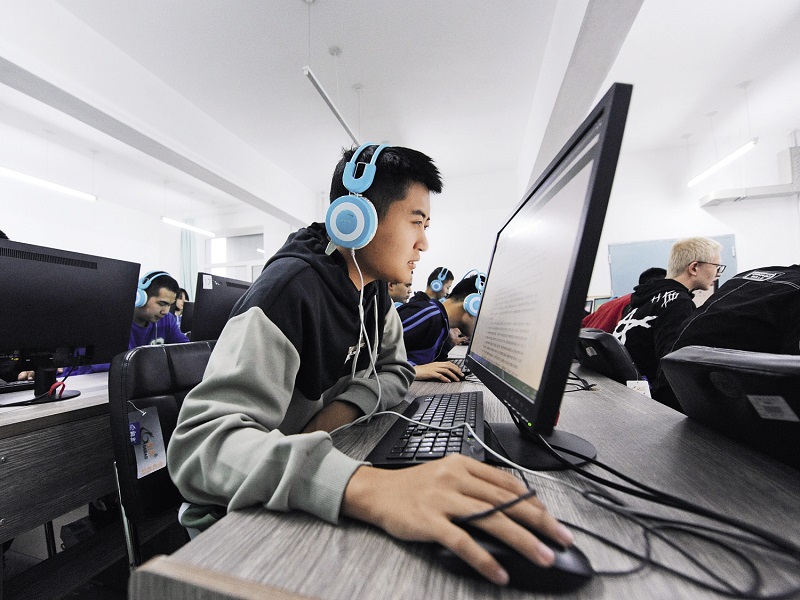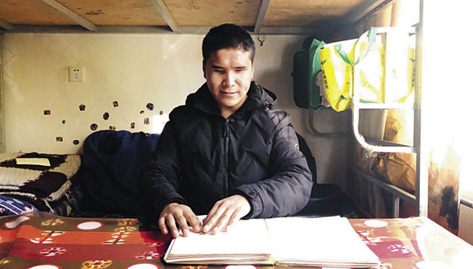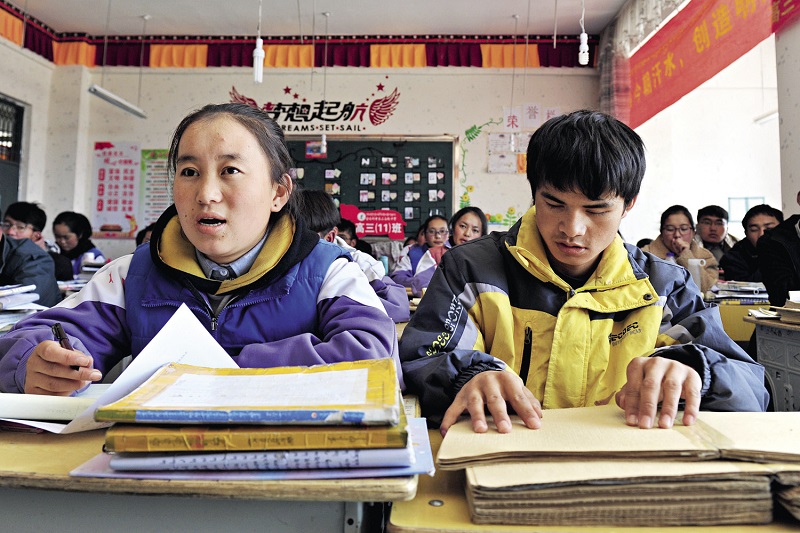A blind college student:Not Limited by What He Can't See
Cering was born into a rural family in Sagya County, Xigaze City in southern Tibet Autonomous Region. Due to illness, he lost vision in both eyes at an early age, and was admitted to the Lhasa School for the Blind at the age of six. Later he transferred to a public school for blind children in Xigaze (230 km from regional capital Lhasa), where he learned braille and finished primary education. Schooling opened a door to the world for him that he could not see.
“I was a little boy back then, but had clear goals for study. I knew it [education] is the only way for me to make up for visual impairment and learn about the external world,” recalled Cering.
His father did all he could to keep his son in school, taking on odd jobs in addition to farming to support his big family. Many people also offered generous help. This allowed Cering to finish high school. In the summer of 2018, he applied for college and today he is a student at Tibet University.

Students with vision impairments taking a computer class at the Special Education School of Changchun University, Jilin Province, on October 26, 2021. A customized software enables them to both “see” and hear the study materials.
A Life-Changing Exam
Before the college entrance examination, his teacher asked Cering to specify his special needs. He asked for two braille typewriters, two desks and a portable chair. All were provided during the exam. For his convenience, local authorities assigned him to a school close to his home for the exam, the municipal disabled persons’ federation sent a car to drive him there, his high school provided him the typewriters, and a teacher accompanied him during the days of the exam.
With all this support behind him, Cering started the exam full of confidence. He soon however encountered difficulties. For most of the previous years he attended normal schools, where teachers read the questions out loud, and he would answer on a typewriter. He had little experience in taking tests on braille papers.
“I touched the papers, a good stack of them, especially those for English and comprehensive social sciences,” said Cering. He then began to worry that he could not finish them on time, which he didn’t. He had no time to complete the reading comprehension and writing in the English exam, and also left some sections blank on the papers of comprehensive social sciences. But to his relief, the exam was free of graphs and other contents that would be difficult to figure out by touching. “This shows consideration for the needs of blind students, I truly appreciate it,” he said later.
As the only blind student participating in the 2018 college entrance exam in Tibet, Cering scored 422, which was 47 above the admission threshold for ethnic social science majors in class A colleges in the region. He was enrolled by the literature school of Tibet University.

Cering, a blind student of Tibet University, intends to become a teacher for blind Tibetan children after graduation, giving them “eyes“ in their study.
Overcoming More Difficulties
Cering cherished the opportunity of attending college. After learning that he was the third blind student that the university had enrolled, he approached the other two students to learn from them.
One of the other students carried a braille book everywhere he went, and read it even when standing in line in the cafeteria. “I was moved when I heard this, and decided to follow his example,” said Cering.
For blind students attending regular schools, it is difficult to keep up with their classmates, due to the lack of appropriate braille textbooks, exercise books and reading materials, as well as the longer time they need to take notes. Learning of his study difficulties, staff at the university library contacted Cering, who asked them to help procure a braille display that could be connected to a computer. In mid May 2020, he received one from the China Disabled Persons’ Federation. The equipment can translate the electronic content of lectures a teacher gives in class into braille, and hence brings great convenience to Cering’s study.
With the new display, Cering could take notes in the class much faster, but still not as fast as the teacher spoke. So he needed the help of his classmates to fill in the information he missed. The English class is another challenge. Cering recorded every class so he could listen to them later. To catch up, he needed to invest more time and energy than other students, which ultimately paid off, thanks to the support of teachers and classmates. “They accompany me to and from the dormitory, classrooms and library, and cheer me up when I encounter difficulties,” he said after scoring well in all his subjects.

Grade 12 students of No. 3 Senior Middle School in Xigaze, Tibet, are preparing for the upcoming college entrance exam on March 17, 2019. Five of them are blind or visually impaired.
Relaying the Love
Cering spends his spare time playing flute and singing. One of his favorite songs is Tomorrow Is a Better Day. He hopes his music can convey his love for life and bring hope and warmth to other people.
He also spends lots of time reading. To his delight, his university library has increased its collection of braille books in recent years. He has read two dozen books including Xi Jinping: The Governance of China, which gave him great solace and inspiration.
Through the reading of a volunteer of the China Braille Library in Beijing, Cering read the book My Path Leads to Tibet (Mein Weg führt nach Tibet) by Sabriye Tenberken, a German Tibetologist and co-founder of the organization Braille Without Borders. He is deeply impressed by how Tenberken, who was also blind, contributed to the education and rehabilitation of blind people in Tibet. The book has motivated him further to become a teacher for blind Tibetan children after graduation. He hopes he could give them “eyes” in their study.
Cering was elected an outstanding college student for his self-improvement in December 2020, but he is humble about his achievement. “I did nothing spectacular. Even daily routines that are easy for other people require strenuous effort for me. I fully understand that without the help of my classmates from primary school to college, I would not have been able to move around the campus, have meals in the cafeteria, or get to my dormitory. They are my eyes, and bring light into my life. They are my sun,” said Cering gratefully.
blog comments powered by